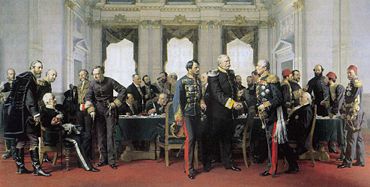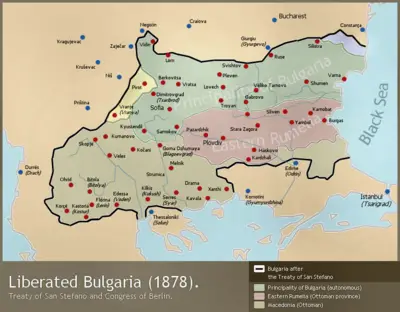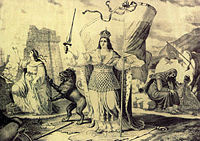Congress of Berlin
The Congress of Berlin (June 13 - July 13, 1878) was a meeting of the European Great Powers' and the Ottoman Empire's leading statesmen in Berlin in 1878. It was organized under the auspices of the Concert of Europe. In the wake of the Russo-Turkish War (1877–78), the meeting's aim was to reorganize the countries of the Balkans. Otto von Bismarck, who led the Congress, undertook to balance the distinct interests of Britain, Russia, and Austria-Hungary. As a consequence, although various compromises were made, differences between Russia and Austria-Hungary intensified, as did the nationality question in the Balkans. The congress was convened to revise the Treaty of San Stefano and to keep Constantinople in Ottoman hands. It effectively disavowed Russia's victory over the decaying Ottoman Empire in the Russo-Turkish War, 1877-78.
The Congress of Berlin redistributed back to the Ottoman Empire certain Bulgarian territories that the previous treaty had given to the Principality of Bulgaria, most notably Macedonia. Albania, and Thrace remained Ottoman. The congress formally recognized independence of the de facto sovereign states of Romania, Serbia, and Montenegro but placed Bosnia and Herzegovina under Austria-Hungary. The Congress also set in motion steps to take control of Ottoman finances to repay debts owed to European bankers. On the one hand, the Congress shows what states can achieve when they agree to cooperate. On the other hand, the Congress subordinated the interests of the people of the Balkans to those of the Great Powers. Yet the Congress and the Concert of Europe did feed into the creation of the League of Nations; they proved that senior representatives of states could meet and reach binding decisions. The world, however, will remain a place where some people experience injustice caused by others' greed until nations cease to act only or almost always only to promote their self-interest at the cost of the interests of others.
Proceedings
The Congress was attended by the British Empire, Austria-Hungary, France, the German Empire, Italy, the Russian Empire, and the Ottoman Empire. Delegates from Greece, Romania, Serbia, and Montenegro attended the sessions in which their states were concerned, but were not members of the congress.
The congress was solicited by the rivals of the Russian Empire, particularly by Austria-Hungary and Britain, and hosted in 1878 by Otto von Bismarck. The Congress of Berlin proposed and ratified the Treaty of Berlin.
The meetings were held at Bismarck’s chancellery, the former Radziwill Palace, from June 13, 1878 until July 13, 1878. The congress revised or eliminated 18 of the 29 articles in the Treaty of San Stefano. Furthermore, using as a foundation the treaties of Paris (1856) and Washington (1871), the treaty effected a rearrangement of the Eastern situation.
Main issues
The principal mission of the World Powers at the congress was to deal a fatal blow to the burgeoning movement of pan-Slavism. The movement caused serious concern in Berlin and particularly in Vienna, which was afraid that the repressed Slavic nationalities within their own empire would revolt against the Habsburgs. The governments in London and Paris were nervous about the diminishing influence of the Ottoman Empire in the south, which invited increased Russian power and influence in the region, where both Britain and France were poised to colonize Egypt and Palestine. Russia and Austria-Hungary both had vested interests in the Balkans, which bordered their Empires and where they claimed the right to protect, respectively, Eastern Orthodox and Roman Catholic Christians.
Through the Treaty of San Stefano, the Russians, led by chancellor Alexander Gorchakov, had managed to create the Bulgarian autonomous principality under Ottoman Empire's nominal rule, thus sparking British well-entrenched fears of growing Russian influence in the East. This state had access to the Aegean Sea and comprised a very large portion of Macedonia that could have at any time threatened the Straits that separate the Black Sea from the Mediterranean.
This arrangement was not acceptable to the British Empire, which considered the entire Mediterranean Sea to be, in effect, a British sphere of influence, and saw any Russian attempt to gain access there as a grave threat to its power. Just a week before the Congress, Prime Minister Benjamin Disraeli had concluded a secret alliance with the Ottomans against Russia, whereby Britain was allowed to occupy the strategically placed island of Cyprus. This agreement predetermined Disraeli's position during the Congress and led him to issue threats to unleash a war against Russia if she did not comply with Turkish demands.
Ceding to Russia's pressure, Romania, Serbia, and Montenegro were declared independent principalities. The full independence of Bulgaria, however, was denied. It was promised autonomy, and guarantees were made against Turkish interference, but these were largely ignored. The Dobruja was given to Romania; Montenegro obtained Niksic, Podgorica, Bar, and Plav-Gusinje. The Turkish government, or Porte, agreed to obey the specifications contained in the Organic Law of 1868, and to guarantee the civil rights of non-Muslim subjects. Bosnia and Herzegovina were placed under the administration of Austria-Hungary. Austria-Hungary feared nationalist revolts from its own ethnic groups, among whom Slavs were already well represented. It was, ironically perhaps, the type of nationalism that had led to German and Italian reunification that was also sweeping through the Balkans, the idea that distinct linguistic-ethnic groups constituted a "nation," especially if they were also a majority in a given territory.
Russia agreed that Bulgaria should be split up into three parts. The southwestern part remained under Turkish rule. Eastern Rumelia became an autonomous province and the remainder was the new state of Bulgaria. Russia retained southern Bessarabia and Austria received the right to "occupy and administer" Bosnia and Herzegovina, a controversial clause which eventually precipitated the Bosnian crisis of 1908.
Bismarck as host
The Congress of Berlin is frequently viewed as the culmination of the "Battle of Chancellors" involving Alexander Gorchakov of Russia and Otto von Bismarck of Germany. They were able to effectively persuade other European leaders that a free and independent Bulgaria would greatly improve the security risks posed by a disintegrating Ottoman Empire. According to German historian Erich Eyck, Bismarck supported Russia's persuasion that "Turkish rule over a Christian community (Bulgaria) was an anachronism which undoubtedly gave rise to insurrection and bloodshed and should therefore be ended."[1] He used the Great Eastern Crisis of 1875 as proof of growing animosity in the region.
Bismarck's ultimate goal during the Congress of Berlin was not to upset Germany's status on the international platform. He did not wish to disrupt the Three Emperor's League by choosing between Russia and Austria as an ally.[1] In order to maintain peace in Europe, Bismarck sought to convince other European diplomats on dividing up the Balkans so as to foster greater stability. During the process of division, Russia began to feel short-changed even though she eventually gained independence for Bulgaria. One can therefore see the underpinnings of the alliance problems in Europe prior to the First World War.
One reason why Bismarck was able to mediate the various tensions present at the Congress of Berlin stemmed from his diplomatic persona. He was an ardent pacifist when international affairs did not pertain to Germany directly. On the other hand, Bismarck was aggressive whenever Germany's national interest was on the line. At the Congress of Berlin, Germany As a result, Bismarck claimed impartiality on behalf of Germany at the Congress. In fact, at the time Germany did not have "active interests in the Balkans" so Bismarck had no "reason to deceive anyone." This claim enabled him to preside over the negotiations with a keen eye for foul play. A major concern was that as Ottoman "influence ebbed from its Western frontier, the administrations and armies of the other three empires edged ever closer to one another."[2]
According to Henry Kissinger, the congress saw a shift in Bismarck's Realpolitik.[3] Until then, as Germany had become too powerful for isolation, his policy was to maintain the Three Emperors League of Russia, Austria-Hungary and Germany. Now that he could no longer rely on Russia's alliance, he began to form relations with as many potential enemies as possible. Neither Germany or Austria-Hungary were keen to see the collapse of the Ottoman Empire, "although they were hardly friends" they "regarded the prospect of an armed rebellion overthrowing an established monarchy with considerable reserve." Bismarck also saw the Balkans as a "necessary conduit for the establishment of" Germany's "imperial aims in the Middle East."[4]
Proceedings
The Turkish chief delegate was a Greek Christian, who would take the brunt of the blame for the "disaster that was bound to overtake the Ottoman Empire at the Congress."[5] Before he was able to agree to any proposal, however, without having referred it back to Istanbul for a response. He often had to wait several days.[6] Every opportunity was taken by the other powers to snub the Turks, such as when an orchestra played music from all other countries represented but "refused to do battler with Turkish music."[5]
Ottoman Finance
To pay for the Crimean War, the Sultan had taken out large loans from European Banks. In 1875, he had defaulted on payment. Loans "stood at more than 200 million pounds sterling."[7] The 18th protocol of the Berlin Congress authorized the establishment at Constantinople of a Financial Commission whose members would be appointed by the Great Powers. The Commission would investigate complaints from bondholders of the Ottoman debts, and propose a solution. In 1881, the Ottoman Public Debt Administration was set up, which collected taxed and handed them over to the European creditors.
Legacy
Italy was dissatisfied with the results of the Congress, and the situation between Greece and the Ottoman Empire was left unresolved. The Bosnians and Herzegovinans would also prove to be a problem to the Austro-Hungarian Empire in later decades. The League of Three Emperors, established in 1873, was destroyed, as Russia saw lack of German support on the issue of Bulgaria's full independence as a breach of loyalty and alliance. There was no agreement on a border between Greece and Turkey. In 1881, after protracted negotiations, a compromise border was accepted following a naval demonstration of the Powers' strength. The congress sowed the seeds of further conflicts, including the Balkan Wars, and the First World War.
Up until Berlin, Turkey had been viewed as a European power. Stripped of almost all European territory, it was no longer viewed as part of Europe.[8] The Congress also successfully show-cased Berlin as a European capital and for the "first time as a … diplomatic center."[9]
According to Fromkin, a change in Britain's relations with the Ottoman also resulted in the Empire turning towards Bismarck's open arms. Having aided the Ottomans against Russia in the Crimean War, under William Ewart Gladstone Britain's attitude towards the Empire changed; "Claiming that the Sultan's regime was a 'bottomless pit of fraud and falsehood,' Gladstone had withdrawn British protection and influence from Constantinople."[10] Increasingly, Germany stepped into this void, becoming increasingly influential until in 1914 a formal defense alliance was signed, which took the Ottoman Empire into World War I on Germany's side. That resulted in the loss of the Empire's non-European provinces, which were divided up and distributed to the victors. Turkey, however, emerged as a secular nation state following the Treaty of Lausanne in July 1923, and avoided the type of humiliating terms that were imposed on Germany. Under their post-war leader, Mustafa Kemal Atatürk the Turks successfully argued that the Turkish people should not be blamed for the mistakes of the Ottoman government.
The Congress of Berlin raised the Concert of Europe to the status of the de facto government of the world. The Concert, however, lacked accountability and represented European interests, not those of the colonized or of non-European states. Yet the idea that a body that could bring senior representatives of nation-states together and enable cooperation would feed into the formation of the League of Nations and of its successor, the United Nation. The Congress, however, subordinated the interests of the people of the region with which it was mainly concerned, the Balkans, to those of the great powers. The world will only shift towards becoming a fairer, more just place for all people when nations begin to consider the interests of humanity as a whole, of which their own interests are part. and cease to act only or almost always only in a way that promotes self-interest at the cost of the interests of others.
Delegates
Great Britain
- Benjamin Disraeli
- Marquess of Salisbury
- Lord Russell
Russia
- Prince Gorchakov
- Count Shuvalov
- Baron d'Oubril
Germany
- Otto von Bismarck
- Prince Hohenlohe
- Chancellor von Bülow
Austria-Hungary
- Count Andrássy
- Count Károlyi
- Baron Heinrich Karl von Haymerle
France
- Monsieur Waddington
- Comte de Saint-Vallier
- Monsieur Desprey
Italy
- Count Corti
- Count De Launay
Ottoman Empire
- Karatheodori Pasha
- Sadoullah Bey
- Mehemet Ali Pasha
- Catholicos Mkrtich Khrimian (representing Armenian population)
Romania
- Ion C. Brătianu
- Mihail Kogălniceanu
Greece
- Theodoros Deligiannis
Serbia
- Jovan Ristić
Montenegro also sent delegates.
Notes
- ↑ 1.0 1.1 Eyck (1964), 245-46.
- ↑ Glenny (2000), 144.
- ↑ Henry Kissinger, Diplomacy (New York, NY: Simon & Schuster, 1995, ISBN 9780671510992), 139-143.
- ↑ Glenny (2000), 128.
- ↑ 5.0 5.1 Glenny (2000), 140.
- ↑ Glenny (2000), 141.
- ↑ Pamuk (2000), 214.
- ↑ Quataert (2005), 2.
- ↑ Dill (1970), 181.
- ↑ Fromkin (1989), 30.
ReferencesISBN links support NWE through referral fees
- Anderson, M. S. 1991. The Eastern Question, 1774-1923: A Study in International Relations. Houndmills, UK: Macmillan Education. ISBN 9780333037812.
- Dill, Marshall. 1970. Germany; a Modern History. Ann Arbor, MI: University of Michigan Press. ISBN 9780472071012.
- Eyck, Erich. 1964. Bismarck and the German Empire. New York, NY: W.W. Norton.
- Fromkin, David. 1989. A Peace to End All Peace: Creating the Modern Middle East, 1914-1922. New York, NY: H. Holt. ISBN 9780805008579.
- Glenny, Misha. 2000. The Balkans: Nationalism, War, and the Great Powers, 1804-1999. New York, NY: Viking. ISBN 9780670853380.
- Medlicott, W.N. 1956. Bismarck, Gladstone, and the Concert of Europe. London, UK: University of London, Athlone Press.
- Medlicott, W.N. 1979. The Congress of Berlin and After: A Diplomatic History of the Near Eastern Settlement, 1878-1880. London, UK: Methuen.
- Pamuk, Şevket. 2000. A Monetary History of the Ottoman Empire. Cambridge studies in Islamic civilization. Cambridge, UK: Cambridge University Press. ISBN 9780521441971.
- Quataert, Donald. 2005. The Ottoman Empire, 1700-1922. New Approaches to European History. Cambridge, UK: Cambridge University Press. ISBN 9780521839105.
Caregory:Politics
Credits
New World Encyclopedia writers and editors rewrote and completed the Wikipedia article in accordance with New World Encyclopedia standards. This article abides by terms of the Creative Commons CC-by-sa 3.0 License (CC-by-sa), which may be used and disseminated with proper attribution. Credit is due under the terms of this license that can reference both the New World Encyclopedia contributors and the selfless volunteer contributors of the Wikimedia Foundation. To cite this article click here for a list of acceptable citing formats.The history of earlier contributions by wikipedians is accessible to researchers here:
The history of this article since it was imported to New World Encyclopedia:
Note: Some restrictions may apply to use of individual images which are separately licensed.


